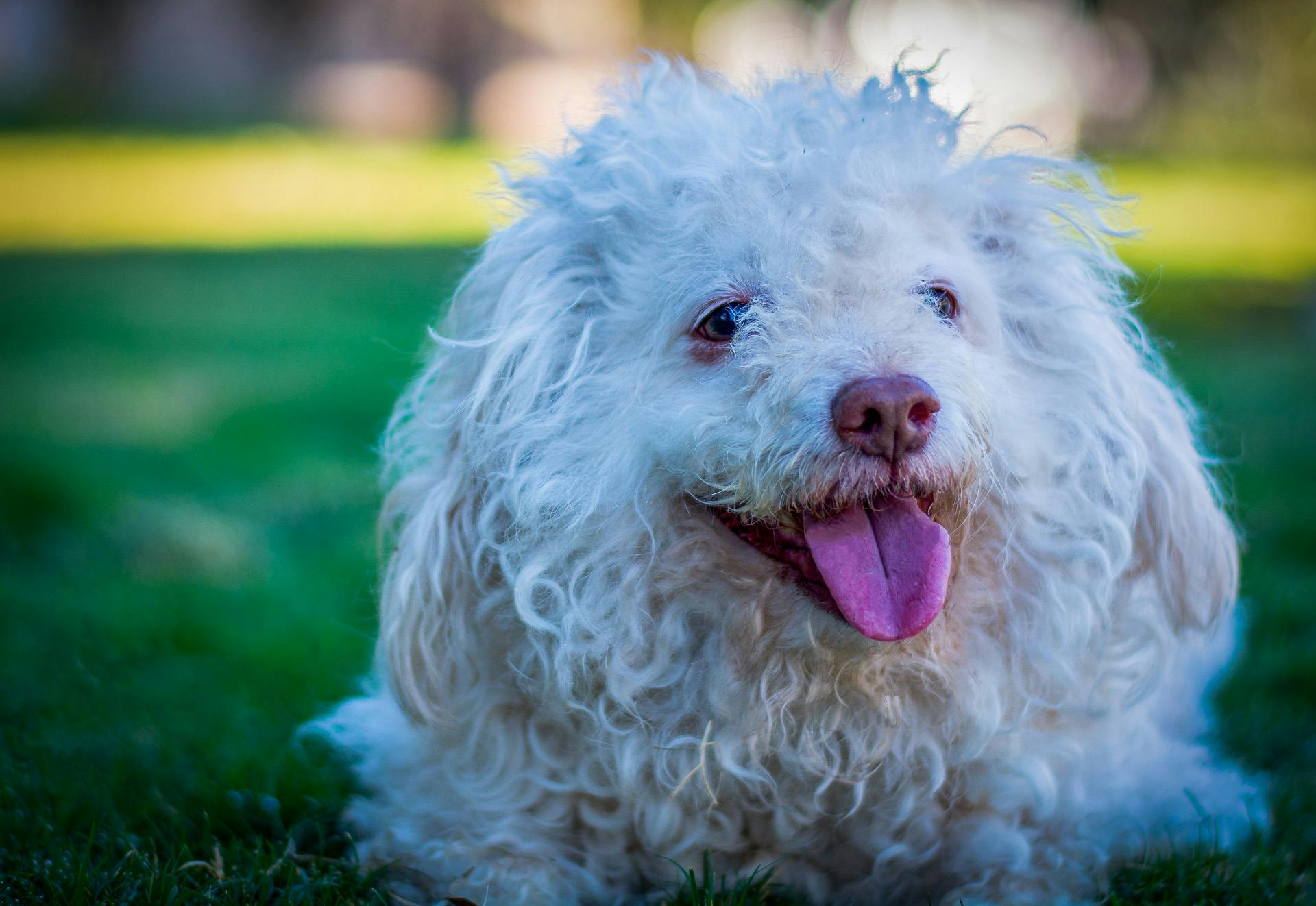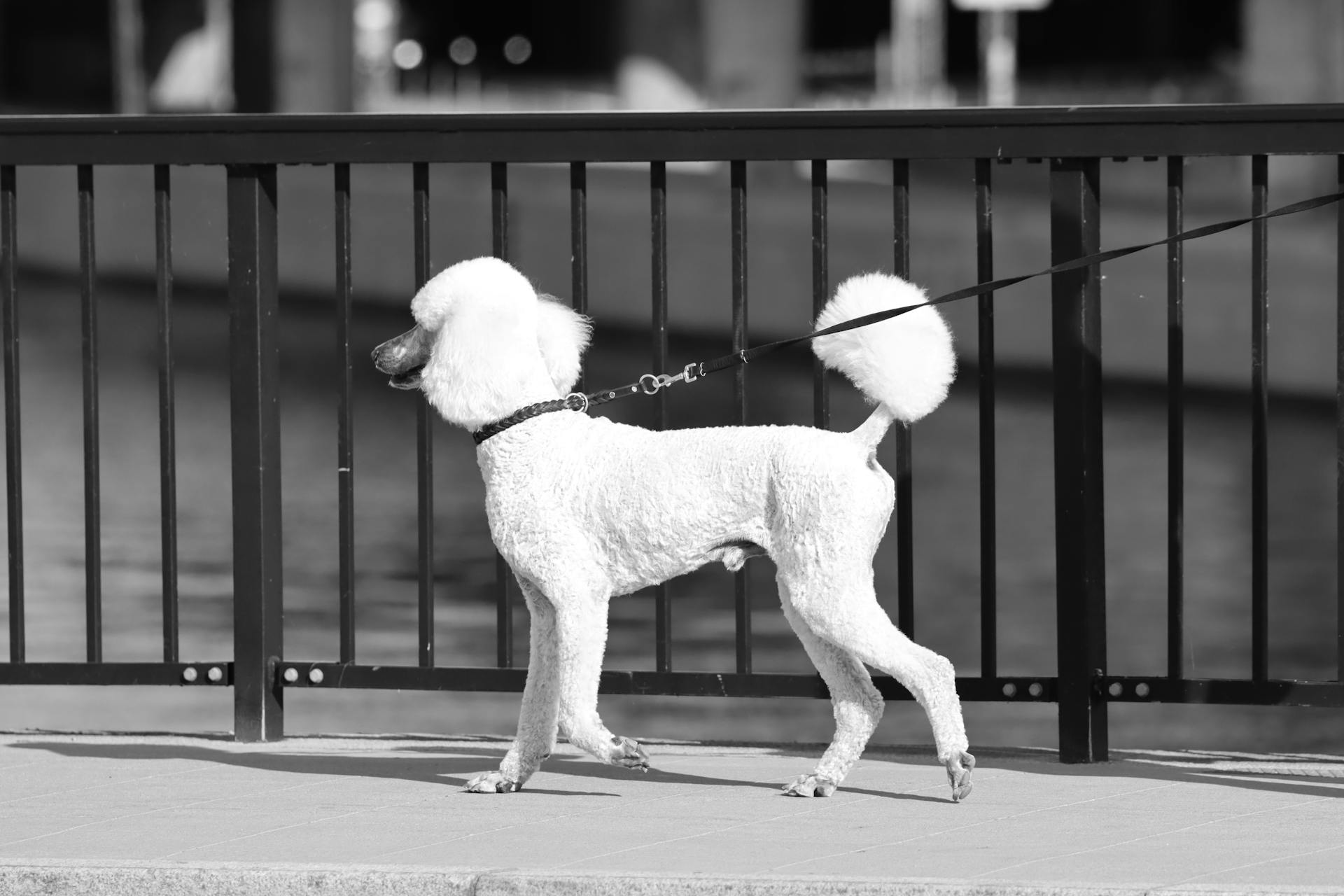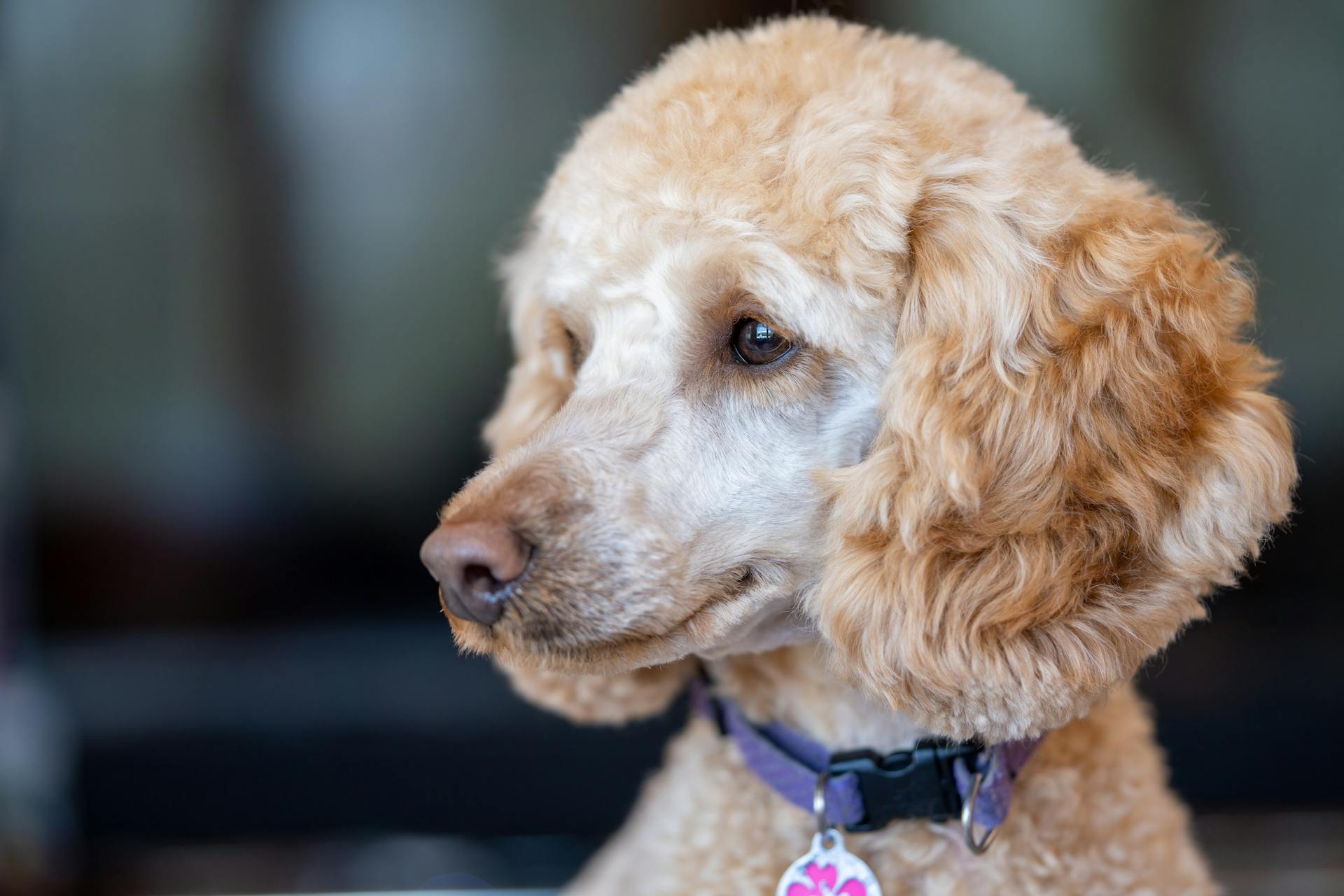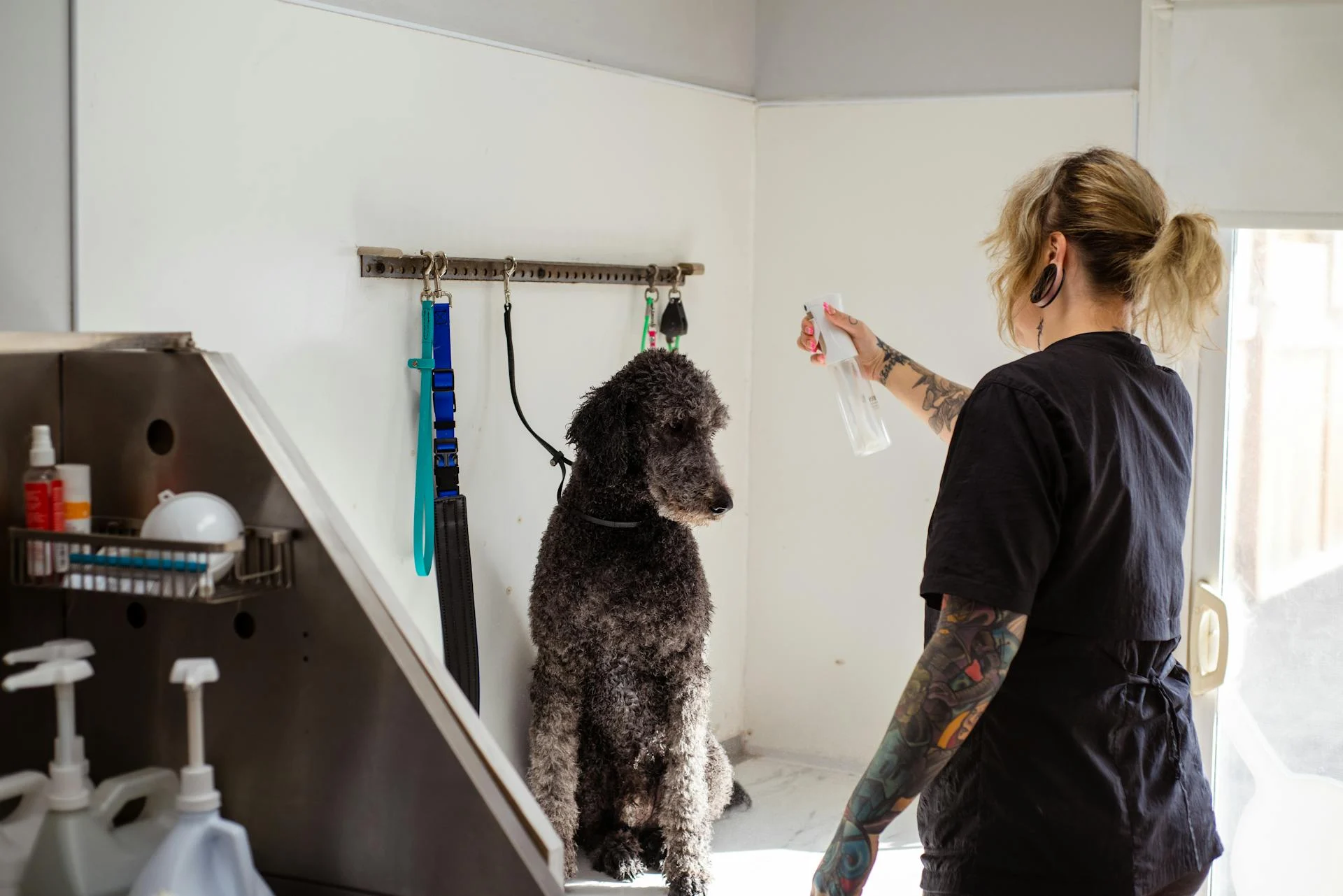
Poodles are intelligent dogs that thrive on mental and physical stimulation. They require regular exercise, such as daily walks and playtime.
To keep your poodle happy and healthy, it's essential to provide them with a balanced diet. A high-quality dog food that meets their nutritional needs is a good starting point.
Poodles have a thick, curly coat that requires regular grooming. This can be a time-consuming task, but it's necessary to prevent matting and tangling.
With proper care and attention, poodles can live up to 15 years or more.
Poodle Characteristics
Poodles are highly social dogs that require regular, close interaction with family members. They thrive on human companionship and can become destructive if left alone for too long.
Their intelligence is one of their most notable characteristics, making them highly trainable and exceling in performance events. Poodles are known to be extremely affectionate with children, which makes them a great addition to families.
The breed's harsh, dense coat is another distinctive feature, presented in various trims or corded styles. This coat requires regular grooming to prevent matting and tangling.
Poodles are also known for their sense of humor, which adds to their trainability and overall charm. They are highly intelligent dogs that can pick up commands quickly.
Their head shape is proportionate to their body size, with a long and moderately rounded skull. The muzzle is straight and roughly equal in length to the skull, with a slight chiseling under the eyes.
Poodles have a complete set of evenly spaced, white teeth meeting in a scissors bite. This is essential for their overall health and well-being.
Their eyes are oval in shape, set wide apart to give an alert, intelligent expression. The eye color depends on the coat color, ranging from dark brown to dark amber.
Their ears are drop-shaped, with long, wide, densely-feathered ear leather. They are set at or slightly below eye level and hang close to the head.
Poodles are generally a healthy breed, but they can be prone to certain health issues if not properly cared for. Regular grooming and training can help prevent these issues.
Additional reading: Bull Terrier Head Shape
Grooming and Care
Poodles require regular grooming to prevent matting and tangling of their curly coats.
Brushing your Poodle's coat daily is essential to prevent a shell of matted hair from forming.
Poodles need to be clipped every four to six weeks, and it's best to have a professional groomer do it.
White Poodles are prone to tearing around the eyes, which needs to be taken care of.
Daily walks are a must for Poodles, and they can get enough exercise in a small area like an apartment.
However, miniature Poodles ideally need a small yard, and standard Poodles need a good-sized fenced area.
Poodles are highly versatile and can participate in various activities like agility, obedience, and waterfowl hunting.
They also need mental challenges, so games and organized activities should be part of their routine.
Poodles are prone to certain health issues, including patellar luxation, gastric dilatation-volvulus, hip dysplasia, and sebaceous adenitis.
For another approach, see: How Much Exercise Do Labrador Retrievers Need
Regular nail trimming is necessary to prevent painful splitting, cracking, or breaking of the nails.
Poodles can thrive in any type of home, from apartments to estates, as long as they have regular exercise and human companionship.
They prefer to live indoors with the family, especially the smaller Toy and Miniature Poodles.
Poodles are intelligent and learn quickly, but owners need to be careful not to accidentally teach them bad habits.
Regular grooming is necessary to prevent matting and tangling of their curly coats, and they don't shed heavily.
Poodles come in 10 standard coat colors, including apricot, black, blue, brown, cream, grey, red, silver, silver beige, and white.
Readers also liked: Thai Ridgeback Colors
Health and Concerns
The Poodle's life span is a respectable 10 to 15 years.
They can be quite sensitive to their environment, especially Miniature and Toy Poodles, who often react poorly to noise and activity.
Separation anxiety may be a concern for some Poodle owners.
High energy levels are a characteristic of the breed, which can manifest as a love for jumping and bouncing.
Poodles are known to bark, so be prepared for some noise.
While Poodles are generally a healthy breed, they can be prone to certain health issues.
Some of the common health issues that may affect Poodles include Addison's disease, gastric dilatation and volvulus, hip dysplasia, epilepsy, chronic active hepatitis, thyroid problems, sebaceous adenitis, and eye diseases.
Cancer is also a risk for Poodles.
A reputable breeder who engages in responsible breeding practices can help minimize serious health concerns in a Poodle.
Regular screening for common diseases and conditions can also help detect potential issues early on.
Here's a list of some of the health issues that may affect Poodles:
- Addison's disease (adrenal insufficiency)
- Gastric dilatation and volvulus ('bloat')
- Hip dysplasia
- Epilepsy
- Chronic active hepatitis (liver disease)
- Thyroid problems
- Sebaceous adenitis (inflammatory skin disease)
- Cancer
- Eye diseases
Training and Exercise
Training a Poodle is a breeze, as they're highly trainable and eager to please. They thrive on positive, reward-based methods, which makes them quick to learn new tricks and commands.
With their keen sense of smell and excellent memory, Poodles are natural retrievers and problem-solvers. They're built for the sporting life, and their independence makes them well-suited for hunting and retrieving.
Whether you're a seasoned hunter or a first-time owner, a Poodle's high energy level and love of water make them a great companion for outdoor activities like duck and upland bird hunting.
General Temperament
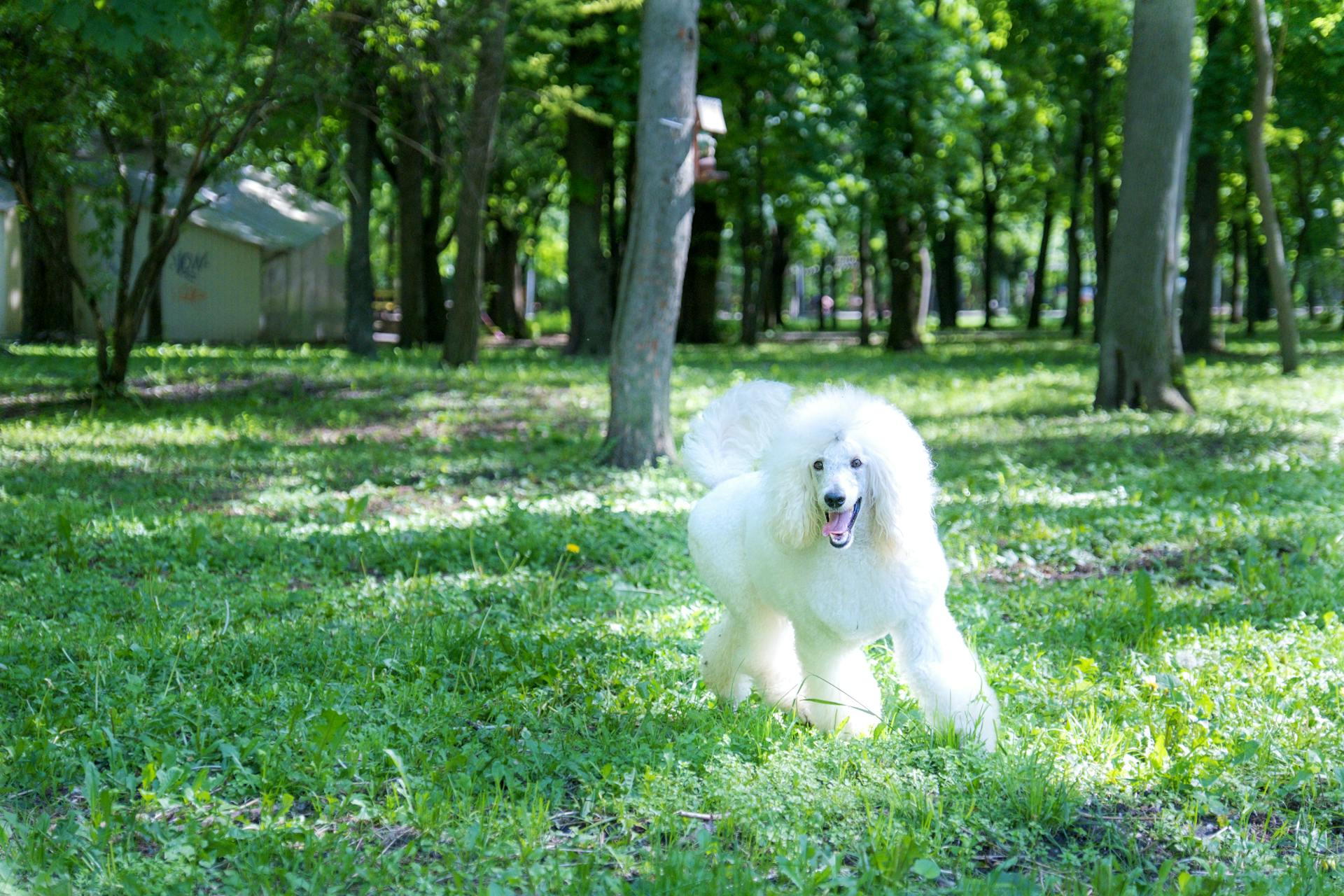
The Poodle is an intelligent companion who knows what you want often even before you ask it. This means being clear and direct with your requests is crucial, as they often try to problem-solve on their own, sometimes with unintended results.
Poodles are warm and friendly, devoted members of the family who thrive on inclusion and attention. They make brilliant, loving companions.
Standard Poodles tend to be more aloof than their smaller counterparts, while Miniature and Toy varieties can enjoy the lapdog lifestyle. This is a generalization, but it's worth noting when considering which size Poodle is right for you.
All Poodles are highly trainable, eager to please and willing to do what is asked of them. With positive, reward-based methods, they can be taught any number of requests, games, and sports.
Their independent thinking and great memory make them quick problem-solvers, which is helpful in various situations, including hunting. Miniature Poodles are clever dogs that can be used for retrieving and flushing game.
As a breed, Poodles are generally playful and fairly affectionate, friendly towards everyone, and not fighters. They make excellent watchdogs, but some can bark to excess.
Explore further: Are Maltese Dogs Friendly
Exercise Needs
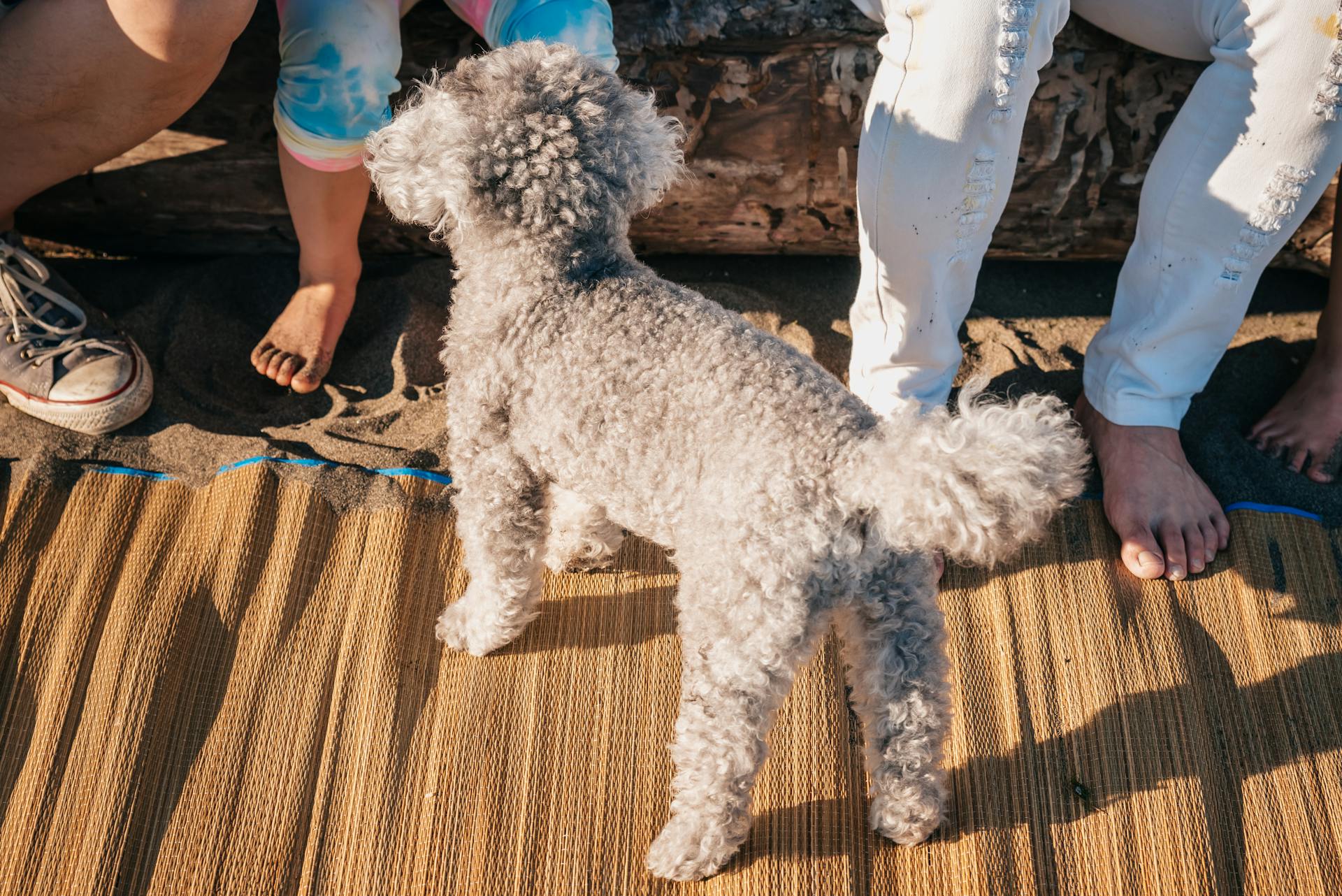
Exercise needs vary by age, with children and adolescents needing at least 60 minutes of moderate to vigorous physical activity per day.
As we get older, our exercise needs change. For adults aged 18-64, the World Health Organization recommends at least 150 minutes of moderate-intensity aerobic physical activity or 75 minutes of vigorous-intensity aerobic physical activity per week.
Older adults, on the other hand, may need to focus on strength training exercises to maintain muscle mass and bone density. This can include activities like weightlifting or bodyweight exercises.
Regular exercise can also improve sleep quality, with studies showing that physical activity can help reduce symptoms of insomnia and other sleep disorders.
In addition to improving physical health, exercise can also have a positive impact on mental health. Aerobic exercise, in particular, has been shown to reduce symptoms of anxiety and depression.
Expand your knowledge: Adult Corgis
Physical Description
The Standard Poodle is a medium-sized, squarely built dog with a distinctive harsh curly coat.
Its coat can be presented in any of several traditional Poodle clips or corded.
The ears are long, drop, and densely feathered.
The tail is normally docked, set high, and carried erect.
The length of body (sternum to point of buttocks) is equal to the height (withers to ground).
The Standard Poodle carries himself with an air of dignity and pride.
Working dogs are not to be penalized under any conditions for scars or blemishes that are due to hunting injuries.
Breed Information
The Poodle is a breed with a rich history, and it's not just about being a show dog. The Standard Poodle is the oldest of the three Poodle types, first recognized in 1887 by the AKC.
They're known for their elegant appearance, with a long, straight muzzle and rounded skull. Poodles have a solid coat color, and their skin and coat should be the same color.
Poodles have been used in the military for centuries and were favored as hard-working hunting companions. They're also water-loving, and have been used for pointing, flushing, and hawking or falconry since the 15th century.
Their sharp sense of smell makes them superior for tasks like truffle-sniffing, which they were employed for throughout Europe.
Readers also liked: Pembroke Welsh Corgi Tricolor Puppy
Breed Data
Originating in medieval Germany, Poodles were bred as duck-hunting dogs, and their name reflects their aquatic heritage. Their distinctive clip was developed to help them stay warm and maneuverable in the water.
Here are some key statistics about Poodles:
The Poodle's life span is impressive, ranging from 10 to 18 years, making them a long-term companion for many families.
Breed Organizations
Breed Organizations can be a great resource for learning more about your favorite breed. The Poodle Club of America can help you find a reputable breeder.
If you're interested in the Poodle breed, the Poodle Club of America is a good place to start.
See what others are reading: American Kennel Club Lancashire Heeler
Rescue Groups
If you're considering bringing a Poodle into your family, it's essential to know that many Poodles are in need of adoption and fostering. There are numerous Poodle Rescue Groups that can help.
If you don't see a rescue listed for your area, contact the national breed club or a local breed club, and they can point you toward a Poodle rescue. They'll be happy to guide you in the right direction.
Here are some notable Poodle Rescue Groups to get you started:
- Carolina Poodle Rescue
- Poodle Club of America
- Standard Poodle Rescue
- Somerset Cottage Poodle Rescue
Frequently Asked Questions
Do Poodles bark a lot?
Poodles are known to be frequent barkers, with all three sizes (Toy, Miniature, and Standard) exhibiting this trait. While not all Poodles bark excessively, their reputation as big barkers is well-deserved.
Featured Images: pexels.com
